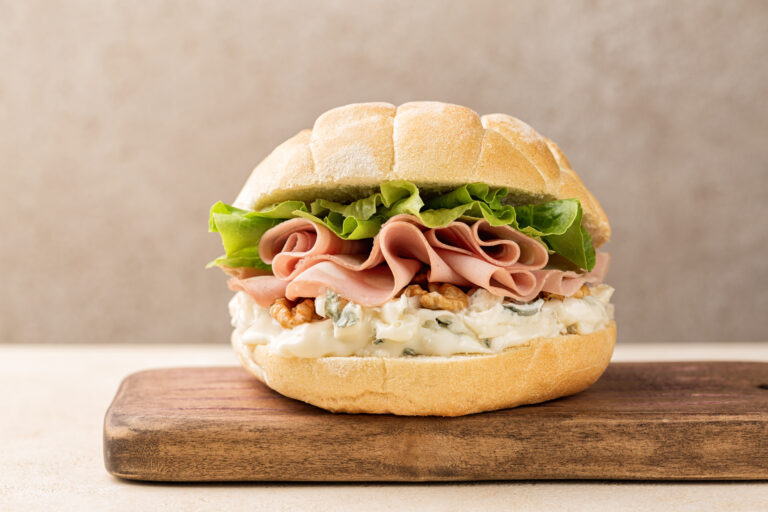5 Facts About the History of Delis to Satisfy Your Curiosity
The article traces the history of the deli, detailing its origins, the meaning of the word delicatessen, and the difference between a deli and a delicatessen, highlighting key points about these beloved culinary establishments.

The delicatessen is one of the world’s most beloved types of culinary establishments. Want a succulent bite of turkey on two slices of pumpernickel? The deli has you covered. In need of a delectable potato salad? Hit the deli. Want to get your hands on the best corned beef you’ve ever had? There’s one place for you, and that’s the deli.
If you want to go deeper than this surface-level deli experience, though, you’re in the right place. I’m a food fanatic in general, but delis have a special place in my heart. So I’ve plumbed the depths of deli history to learn about the immortal shop’s origins, and I’ve assembled all that knowledge here. So if you’re ready to dive deeper into the history of the deli, read on.
Disclosure: As an Amazon Associate, this site earns from qualifying purchases. Thank you!
What Is a Deli?

A deli (short for delicatessen) is a variety of specialty food stores / restaurants. Most famously, these establishments sell sandwiches, packaged morsels like coleslaw and potato salad, and bagels. However, they might also offer cold-cut meats and sliced cheeses outside of sandwiches.
However, as we’ll see in a moment, delis can also sell a much wider variety of specialty foods, from imported bread to jarred delicacies.
Of course, it would be a serious misstep to talk about delis without mentioning Kosher delis. These establishments sell deli foods that follow Jewish dietary restrictions (delis that adhere closely to kosher law, for example, don’t sell cheese alongside beef products). They’re famous for offering delectable morsels from bagels to pastrami-on-rye sandwiches.
Where Did the Word Delicatessen Come From?
If you’ve ever been in a deli and have taken a philosophical turn in between bites of a Reuben or BLT, you might’ve wondered why they call it a deli, anyway. What is a delicatessen?
Shortening the word delicatessen to deli obscures the word’s interesting roots and history.
According to the Oxford English Dictionary, the word “delicatessen” is originally German and referred to fine or specialty foods. In turn, the German word comes from the French “delicatesse” and Italian “delicatezza,” both of which mean delicateness. Interestingly, though, the translated German word is a sort of double entendre: essen is the German word for “meal,” so the word has an added punch.
The word delicatessen entered the English language amidst the surge of German immigration in the nineteenth century. During this time, German food salespeople opened establishments to sell specialty foods from their home nation, often displaying the sign delicatessen to advertise their specialty food (the OED first records the word delicatessen being used this way in 1853).
After this point, however, the word “delicatessen” shifted in meaning, referring not just to the foods but to the place where the foods were sold. From there, non-German speakers began to abbreviate the word from “delicatessen” to “deli,” and the rest is history.
What Is the Difference Between a Deli and a Delicatessen?

Long story short, there’s no technical difference between a deli and a delicatessen – the former word is simply an abbreviation of the latter. However, there might be a slight difference in practice.
In some contexts, “delicatessen” might imply more formality, as in the case of the classic New York eatery Katz’s Delicatessen.
Who Invented the Delicatessen?
We can continue our exploration of the delightful institute known as the delicatessen by asking: who, exactly, invented the deli?
It’s difficult to say exactly who invented the delicatessen, simply because delicatessens are more a category of establishment than one single thing.
Most likely, the “inventor” of the delicatessen is a heroic meat-and-bread lover who was just trying to do an honest day’s work – and changed the face of sandwiches in the process.
Frequently Asked Questions
Check below the answers to some common questions.
When was the first delicatessen?
Just as it is difficult to say who invented the delicatessen, it is challenging to say what the first delicatessen was. Some deli aficionados credit Dallmayr, a German specialty foods company, as the first deli in the world. The company began importing bananas and other tropical foods as early as 1700, giving some credence to this claim.
However, older delicatessens likely existed before Dallmayr – after all, Germany imported food before this time.
The same goes for American delis as we currently understand them. Sprague’s Delicatessen in St. Louis was the first store to use the word “delicatessen” in its name. Katz’s claims to be the oldest Kosher deli in New York City. However, delis existed throughout the country before either one.
Until some brave archivist delves into the history of specialty food businesses everywhere, the world may never know which delicatessen came first.
What Is a Delicatessen?
Long story short, a delicatessen is just the same as a deli. The longer word is simply the origin of the word “deli,” and in the context of the United States, they are interchangeable – though “delicatessen” can sometimes be more formal.
That said, the word delicatessen is still used in Germany to refer to specialty shops, and is not often abbreviated.
More FAQs
What is the literal meaning of delicatessen?
The literal meaning of delicatessen is derived from the German word Delikatessen, which is the plural form of Delikatesse meaning “delicacy” or “fine food.” This term was also spelled as Delicatesse(n) and originated from the French word delicatesse, which is derived from delicat meaning “fine” in French, and ultimately traced back to the Latin word delicatus meaning “alluring.”
Is the word delicatessen French?
The word delicatessen is not French. It was borrowed by the Germans from the French. The obsolete German word delicatessen is a plural form of delicatesse and it refers to “delicacies, ready-to-eat foods.” This term was borrowed from the French word delicatesse, which means “delicacy.” In English, delicatessen originally referred only to specially-prepared food.
What is the origin of the root word deli?
The root word “deli” originated from the German word “Delikatessen,” which is a shortened form of the word “delicatessen.” “Delikatessen” is the plural form of “Delikatesse,” meaning “delicacy” or “fine food” in German. This German word was derived from the French word “delicatesse,” which is an adjective form of “delicat.” “Delicat” itself comes from the Latin word “delicatus.”
What does Delis mean in Latin?
The Latin word “Delis” means pleasure and delight. It is a feminine name of Latin origin and is a shortened form of Delicia. Delis is a rare gem to come across, perfect for the light of your life with its beautiful meanings.
What is difference between deli and bodega?
The difference between a deli and a bodega lies in their primary focus. A bodega is primarily a grocery store, with the possibility of preparing and selling food. On the other hand, a deli primarily specializes in preparing and selling food, although it may also offer grocery items. It is important to note that the distinction between these establishments is influenced by cultural factors, as the term “bodega” originates from Spanish.
What is the oldest delicatessen in New York City?
The oldest delicatessen in New York City is Katz’s Delicatessen, which holds the title of being NYC’s oldest deli.
What does deli mean in England?
The meaning of “deli” in England is a shop or section of a shop that offers food items like cheese and cold meat. It is actually a shortened form of the word “delicatessen”.
What do you call someone who works in a deli?
The person who works in a deli is commonly referred to as a Deli Clerk or Delicatessen Clerk. Their main responsibilities include handling produce, engaging with customers to facilitate sales, slicing meats and cheeses, managing inventory, and providing information to customers about the various types of produce available.
What country did delicatessen originate from?
Delicatessens originated in Germany during the 18th century and later spread to the United States in the mid-19th century.
Where was the first deli delicious?
The first Deli Delicious was established in Fresno, CA. during the early 90’s. It is a fast-casual eatery that specializes in crafting high-quality sandwiches using the finest and most fresh ingredients available. The founders dedicated numerous years to perfecting their exclusive recipes, resulting in Deli Delicious swiftly gaining popularity among the local community.
Where did yellow deli originate?
The Yellow Deli originated in Chattanooga, Tennessee when it first opened in May of 1973, as a heavenly gift from our Father.
Which deli meat is named for an Italian city that is home to the oldest university in Europe?
The deli meat named after an Italian city that is home to the oldest university in Europe is called “bologna,” which is an American sausage derived from the mortadella of Bologna.
What does deli mean in nyc?
The meaning of “deli” in NYC is that it refers to a place where people commonly go to get food. These establishments, known as “delicatessens” or “delis” for short, specialize in preparing various types of food such as sandwiches, pre-made hot or cold dishes like spaghetti and tomato sauce, and salads. It is quite common for individuals in NYC to have a favorite deli that they frequently visit.
Where did Katz deli originate?
The origin of Katz Deli can be traced back to 1888 when the Iceland Brothers opened a small deli called Iceland Brothers on Ludlow Street in New York’s Lower East Side. In 1903, the store’s name was officially changed to “Iceland & Katz” after Willy Katz joined the business.
What is the meaning of the word deli?
The word “deli” refers to a store that sells ready-to-eat food products, such as cooked meats and prepared salads. It is commonly known as a delicatessen. People often visit the deli to purchase items like a pastrami-on-rye sandwich and an egg cream.
Is delicatessen a Yiddish?
Delicatessen is not a Yiddish word. It is a short form of the German word delicatessen, which refers to “delicious things to eat”. In Ashkenazi-Yiddish culture, delicatessen was a type of store and cuisine that specialized in the preparation and sale of cured, preserved, and smoked meats.
What is the original language of delicatessen?
The original language of delicatessen is German. The word delicatessen is derived from the obsolete German word delicatesse, which is the plural form of delicatesse and translates to “delicacies, ready-to-eat foods.” This German term was borrowed from the French word delicatesse, meaning “delicacy.” Initially, in English, delicatessen referred exclusively to specially-prepared food.
What is the difference between a deli and a delicatessen?
The difference between a deli and a delicatessen is that a deli is a shortened form or nickname for a delicatessen. A delicatessen is an American English version of the German word delikatessen, which means “delicacy” or “fine food.” Delis often specialize in the cuisine of a specific region, country, or ethnicity, such as a Jewish deli, German deli, or Greek deli.
What is the original meaning of deli?
The original meaning of deli is derived from the German word Delikatessen, which is a plural form of Delikatesse meaning “delicacy, fine food”. This term was borrowed from the French word delicatesse, which is derived from the Latin word delicatus, and has been attested since 1954.
What is a synonym for the word delicatessen?
A synonym for the word delicatessen is cafeteria, deli, charcuterie, or restaurant.
What is the plural form of delicatessen?
The plural form of delicatessen is delicatessens.






